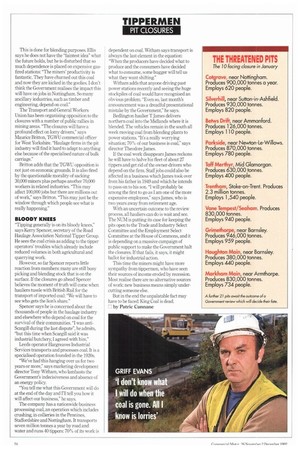TIPPERMEN
Page 26

If you've noticed an error in this article please click here to report it so we can fix it.
PIT CLOSURES
This is done for blending purposes. Ellis says he does not have the "faintest idea" what the future holds, but he is disturbed that so much dependence is placed on expensive gasfired stations: "The miners' productivity is fantastic. They have churned out this coal and now they are kicked in the goalies. I don't think the Government realises the impact this will have on jobs in Nottingham. So many ancillary industries, such as timber and engineering, depend on coal."
The Transport and General Workers Union has been organising opposition to the closures with a number of public rallies in mining areas. "The closures will have a profound effect on lorry drivers," says Maurice Britton, TGWU commercial officer for West Yorkshire. "Haulage firms in the pit industry will find it hard to adapt to anything else because of the specialised nature of bulk carriage."
Britton adds that the TGWU opposition is not just on economic grounds. It is also fired by the questionable morality of sacking 30,000 miners plus perhaps another 70,000 workers in related industries. "This may affect 100,030 jobs but there are millions out of work," says Britton. "This may just be the window through which people see what is really happening."
"Tipping generally is on its bloody knees," says Kerry Spencer, secretary of the Road Haulage Association National Tipper Group. He sees the coal crisis as adding to the tipper operators' troubles which already include reduced volumes in both agricultural and quarrying work.
However, so far Spencer reports little reaction from members: many are still busy picking and blending stock that is on the surface. If the closures go ahead Spencer believes the moment of truth will come when hauliers tussle with British Rail for the transport of imported coal: "We will have to see who gets the lion's share."
Spencer says he is concerned about the thousands of people in the haulage industry and elsewhere who depend on coal for the survival of their communities. "I was antiScargill during the last dispute", he admits, "but this time when Scargill said it was industrial butchery, I agreed with him."
Leeds operator Hargreaves Industrial Services transports and processes coal. It is a specialised operation founded in the 1920s.
"We've had this hanging over us for two years or more," says marketing development director Tony Witham, who lambasts the Government's indecisiveness and absence of an energy policy.
You tell me what this Government will do at the end of the day and I'll tell you how it will affect our business," he says.
The company has a nationwide business processing coal, an operation which includes crushing, in collieries in the Pennines, Staffordshire and Nottingham. It transports seven million tonnes a year by road and water and runs 40 tippers: 70% of its work is dependent on coal. Witham says transport is always the last element in the equation: "When the producers have decided what to produce and the consumers have decided what to consume, some bugger will tell us what they want shifting."
Witham adds that anyone driving past power stations recently and seeing the huge stockpiles of coal would have recognised an obvious problem. "Even so, last month's announcement was a dreadful presentational mistake by the Government," he says.
Bedlington haulier T James delivers northern coal into the Midlands where it is blended. The vehicles remain in the south all week moving coal from blending plants to power stations. "It's a really worrying situation; 70% of our business is coal," says director Theodore James.
If the coal work disappears James reckons he will have to halve his fleet of about 27 tippers and get rid of the owner-drivers who depend on the firm. Staff jobs could also be affected in a business which James took over from his father in 1949 and which he intends to pass on to his son. "I will probably be among the first to go as I am one of the more expensive employees," says James, who is two years away from retirement age.
With an uncertain outcome to the review process, all hauliers can do is wait and see. The NUM is putting its case for keeping the pits open to the Trade and Industry Select Committee and the Employment Select Committee at the House of Commons, and it is depending on a massive campaign of public support to make the Government halt the closures. If that fails, it says, it might ballot for industrial action.
This time the miners might have more sympathy from tippermen, who have seen their sources of income eroded by recession. Most realise there are no alternative sources of work: new business means simply undercutting someone else.
But in the end the unpalatable fact may have to be faced: King Coal is dead. 7 by Patric Cunnane












































































